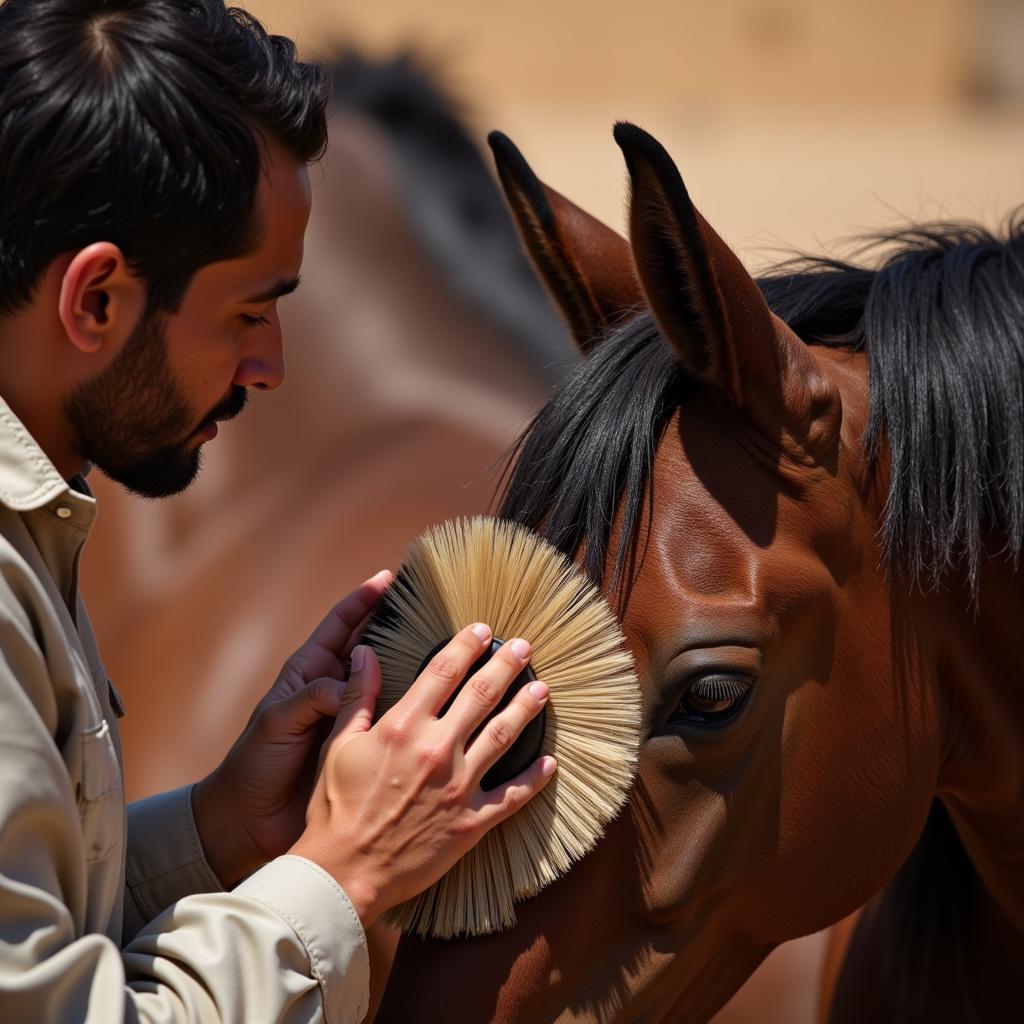The Egypt Horse, a term often used to encompass various equine breeds with historical ties to Egypt, captivates with its rich history and diverse characteristics. From the ancient depictions on pharaoh’s tombs to the modern Arabian horses often associated with the region, exploring the “Egypt horse” unveils a fascinating journey through time and equine heritage. Let’s delve into the captivating world of these magnificent creatures. After the introduction, you can find a beautiful gold horse head.
Unveiling the History of Horses in Egypt
Horses have played a pivotal role in Egyptian civilization for millennia. Ancient Egyptians revered horses, using them in warfare, agriculture, and transportation. Depictions of horses in ancient art, including chariot races and pharaohs riding majestically, testify to their significance. The introduction of the horse to Egypt marked a turning point, revolutionizing warfare and solidifying the power of the pharaohs.
The Arabian Influence: A Prominent Egypt Horse Breed
While there isn’t a single breed specifically called the “Egypt horse,” the Arabian horse is deeply intertwined with the region’s equine history. Known for its distinctive dished face, high tail carriage, and spirited temperament, the Arabian is often considered a cornerstone of Egyptian horse breeding. These horses, prized for their endurance and beauty, have contributed significantly to the development of other breeds worldwide.
“The Arabian horse’s influence on Egyptian equine culture is undeniable,” says Dr. Amira Hassan, renowned equine historian and veterinarian. “Their elegance and resilience have made them a symbol of the region for centuries.”
Characteristics of Egyptian Horses
The horses commonly associated with Egypt, particularly those with Arabian bloodlines, exhibit several notable characteristics. Their refined appearance, combined with their athleticism, makes them highly sought after.
- Graceful Appearance: Elegant and refined, with a distinctive dished face and high-set tail.
- Endurance: Renowned for their stamina and ability to thrive in harsh desert conditions.
- Intelligence: Known for their intelligence and trainability, making them versatile partners.
- Spirited Temperament: Possess a lively and energetic disposition, requiring experienced handlers.
Caring for an Egyptian Horse
Proper care is essential for maintaining the health and well-being of any horse, including those of Egyptian heritage. A balanced diet, regular veterinary care, and a suitable living environment are crucial. Just like choosing the right painting of two horses for your home, selecting the right care regimen for your horse requires careful consideration.
“Providing a stimulating environment is key to keeping Egyptian horses happy and healthy,” advises Dr. Omar El-Sayed, equine behaviorist and veterinarian. “Their intelligence demands mental and physical challenges.”
 Grooming an Egyptian Horse
Grooming an Egyptian Horse
Modern Egypt and its Horses
Today, horses continue to play a role in Egyptian society, albeit a different one than in ancient times. Equestrian sports, leisure riding, and cultural events featuring horses are common. While the role of the horse has evolved, its presence remains a testament to its enduring connection to Egyptian culture. Remember to explore reputable sources like horse paintings famous artists to further enrich your understanding of the horse’s significance in art and culture.
The Future of Egyptian Equine Heritage
Preserving the rich equine heritage of Egypt is vital. Efforts to protect and promote traditional breeds, like those with Arabian lineage, are ongoing. These initiatives aim to ensure that future generations can appreciate the beauty and historical significance of the “Egypt horse.”
“The future of Egyptian equine heritage rests on our commitment to responsible breeding practices and education,” states Dr. Nadia Khalil, equine geneticist. “By sharing our knowledge and passion, we can safeguard these magnificent animals for generations to come.”
 Riding an Egyptian Horse
Riding an Egyptian Horse
Conclusion
The “Egypt horse,” a term often used to refer to various breeds with links to the region, embodies a rich history and diverse characteristics. From the ancient pharaohs to modern equestrian enthusiasts, the horse has played an integral role in Egyptian culture. By understanding and appreciating their history and characteristics, we can ensure the continued legacy of these majestic creatures. Consider adding a touch of equine elegance to your life with a piece of stunning horse jewerly.
FAQ
- Is there a specific breed called the “Egypt horse”? No, it’s a broader term referencing breeds with Egyptian ties.
- What is the most common horse breed associated with Egypt? The Arabian horse.
- What were horses used for in ancient Egypt? Warfare, agriculture, and transportation.
- Are horses still important in modern Egypt? Yes, in equestrian sports, leisure, and cultural events.
- How can I learn more about Egyptian horse breeds? Research online, consult books, and visit reputable stables.
- Where can I find unique horse-themed gifts? Check out our collection of carved horse head.
- What is the significance of horses in Egyptian art? They symbolize power, status, and the close relationship between humans and animals.
For any assistance, please contact us at Phone: 0772127271, Email: [email protected] Or visit us at: QGM2+WX2, Vị Trung, Vị Thuỷ, Hậu Giang, Việt Nam. We have a 24/7 customer service team.